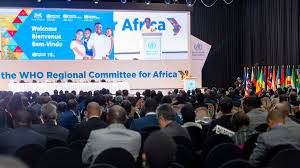African health ministers and government representatives gathering in Brazzaville, Republic of Congo, Tuesday kick off the seventy-fourth session of the World Health Organization (WHO) Regional Committee for Africa.
It is the continent’s flagship health forum held annually to discuss and agree on measures to address health challenges and promote people’s well-being in Africa.
The meeting, which takes place from 26–30 August 2024 in Congolese capital Brazzaville’s, brings together health ministers from the 47 countries making up the WHO African Region to discuss and approve regional policies, and adopt key resolutions to guide the organisation’s work on the continent.
During this year’s meeting, the ministers will also nominate a new Regional Director to succeed Dr Matshidiso Moeti, who is ending her 10-year tenure at the helm.
“The Republic of the Congo is honoured to host this important session of the World Health Organisation’s Regional Committee for Africa,” said President Denis Sassou N’Guesso at the opening of the Regional Committee, pointing out that “health is our greatest asset … WHO’s commitment to this noble cause to ensure people’s survival is a great encouragement …”
“This meeting is being held at a decisive moment for Africa. The continent is facing unprecedented challenges that require immediate and concerted action on our part,” said Ambassador Minata Samaté Cessouma, African Union Commissioner for Health, Humanitarian Affairs and Social Development.
Burning issues to tackle
Key agenda items include a focus on mitigating high rates of child mortality and the need to urgently turn the tide on this significant threat to Africa’s children. Polio and cervical cancer are two other health challenges that will receive special attention. For polio, the aim is to reinforce commitments and strategize to achieve complete eradication; for cervical cancer, a special side event will highlight the need to prioritise prevention through human papillomavirus (HPV) vaccination and screening.
WHO Director-General Dr Tedros Adhanom Ghebreyesus praised member states for strengthening emergency preparedness and primary health care, negotiating a pandemic agreement and supporting the Investment Round to increase sustainable financing for WHO.
But the new mpox outbreaks showed why sustained commitment and investment was needed to protect and promote public health in Africa, Dr Tedros added.
“WHO is committed to working with African countries and partners to bring the mpox outbreaks under control quickly, and I am confident we can,” Dr Tedros said.
“But the emergency highlights the weaknesses in the health security architecture, in Africa and globally. This is why all Member States should actively engage in negotiations on the Pandemic Agreement and invest in WHO and public health, to protect people today and tomorrow.”
This week’s events will also provide a platform to recognise the significant progress made in the WHO African region, specifically the celebrated Transformation Agenda, driven by Dr Moeti during her mandate as Regional Director.
The region has also been declared free of wild poliovirus, marking a historic public health victory, while 19 African countries have successfully eliminated at least one neglected tropical disease.
“Never before have governments and partners been so determined to make a better impact – through supporting integrated approaches to addressing health problems; focusing on people; and reducing the fragmentation that has limited the outcomes of significant health investments,” said Dr Moeti.
About 800 participants are attending the event, including representatives from United Nations agencies, non-governmental organizations, civil society, academia and development partners, either in-person or virtually.
WN/as/APA


